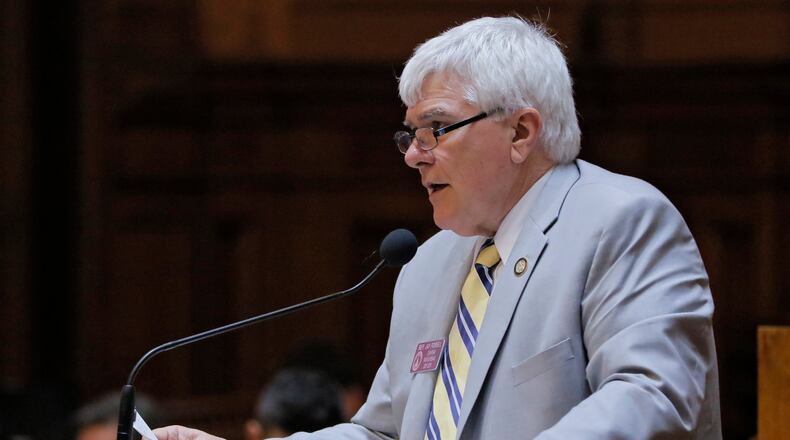The General Assembly approved legislation to lower taxes on Georgians who lease vehicles, but only after removing a controversial provision that would have raised taxes on many used-car buyers.
Both chambers backed the bill early Friday, after the traditional midnight end of the 2017 General Assembly session.
Meanwhile, lawmakers couldn’t come to an agreement on legislation to lower the state’s top income tax rate and mandate that e-retailers collect taxes on their sales.
The two bills were among about a dozen tax measures moving through the Legislature, or stalling on the final day.
Senators said the Georgia House sent $588 million worth of tax-credit and tax-cut bills to the chamber to consider this year.
“At some point we are going to have to make some decisions about picking winners and losers,” said state Sen. Vincent Fort, D-Atlanta, who opposed some of the bills.
Left off the long list of tax breaks this year appears to be the back-to-school sales-tax holiday, a feel-good measure lawmakers typically crow about because it offers the chance for local families to shop for clothes, school goods and other items for a weekend without having to pay sales taxes on those goods.
But the holiday is expensive — costing state and local governments about $70 million in taxes by one estimate. And both conservative and liberal groups say it does little or nothing to spur the economy and often provides minimal benefit to shoppers.
While the sales-tax holiday was little discussed this session, the car-tax bill was one of the hot topics of the year.
House Bill 340, sponsored by state Rep. Shaw Blackmon, R-Bonaire, aimed to address problems created by a 2012 law that changed how cars are taxed in Georgia.
That law started the phaseout of the annual property tax on cars, replacing it with a one-time fee when Georgians buy a new or used car.
The bill would have charged used-cars buyers the 7 percent motor vehicles tax on the sales price of the car or truck sold by a dealer.
Currently, new cars are taxed based on that formula, whereas used cars are usually taxed at the typically lower book value. The used-car lobby worked overtime to kill that provision, and in the end, it was successful.
The part that passed would lower the bill on the same tax to those who lease cars, cutting their tab by up to $74 million in 2019, a number that could grow to $106 million by 2022.
Car dealers said the higher taxes on leased cars instituted in the 2012 law damaged the car leasing business, and they hope the changes made in HB 340 will help fix the problem.
Meanwhile, lawmakers failed to reach a deal on House Bill 329, which would have lowered the the top state income tax rate.
The Senate tacked on House Bill 61, which would force online retailers with at least $250,000 or 200 sales a year in Georgia to either collect and remit to the state sales taxes on purchases or send "tax due" notices each year to customers who spend at least $500 on their site.
Copies of the notices would go to the state Department of Revenue so it would know who owes at least some of the taxes.
The e-retail issue was expected to wind up in court even if it passed. But if the state had been successful, one fiscal analysis suggested that collecting those taxes could mean an extra $274 million in revenue for the state and $200 million for local governments. The combined figure could hit $621 million by 2022.
Several other pieces of tax legislation won approval, including a bill to give the owners of giant yachts a tax break if they agree to get their boats retrofitted or repaired in Georgia. State Rep. Ron Stephens, R-Savannah, said it would spur the creation of a big-boat repair business in his part of the state.
Some lawmakers were critical of the bill.
“Why does it have to be in their business model that they have to come to us for state tax dollars?” state Sen. Nan Orrock, D-Atlanta, asked the Senate sponsor of the bill.
State Sen. Josh McKoon, R-Columbus, said: “We would all like to have special treatment by the Department of Revenue for businesses and industries. The problem is we send a message that if you come to the General Assembly and say you are going to create X number of jobs, you can negotiate special benefits under tax laws.”
Another bill that won final passage earlier Thursday aims to boost the value of a rural hospital tax credit.
The House and Senate agreed to House Bill 180, which would increase from 70 percent to 90 percent the value of the credit taxpayers can earn from contributions to qualifying rural hospitals.
State Rep. Geoff Duncan, R-Cumming, in 2016 championed a plan to create the tax-credit program at 90 percent, but the Senate balked. A 70 percent compromise was signed into law, but the reduced value of the credit has limited its popularity.
Lawmakers also approved a rural Georgia investment measure that would provide $60 million in tax credits for investing in rural Georgia. Supporters say rural Georgia companies need access to capital, critics say it's a give-away to a few giant national capital companies.
Legislators also gave final approval to tax breaks aimed at increasing the number of records, tours and jobs in the music industry in Georgia.
Legislative session coverage
The Atlanta Journal-Constitution has the largest team covering the Georgia Legislature. To see more of its legislative coverage, go to http://www.myajc.com/georgia-legislature/. To track particular bills and resolutions, check out the Georgia Legislative Navigator at http://legislativenavigator.myajc.com/. You can also follow the proceedings on Twitter at http://twitter.com/GAPoliticsNews or on Facebook at http://facebook.com/gapoliticsnewsnow.
Subscribe to our newsletter for more news about Georgia politics. Subscribe to politics news alerts in the AJC news app.
About the Author
Keep Reading
The Latest
Featured




